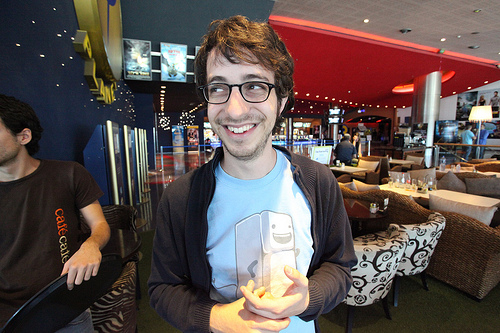Earlier this week, Interlude.fm, an interactive video platform from popular Israeli musician, Yoni Bloch, excited the industry with its presentation (and victory)  at the second annual Techonomy conference outside of Tel Aviv. The company’s technology, similar to the “choose-your-own-adventure” stories that were popular in the early 1980s, offers viewers the opportunity to decide the actions of people in the video they are watching. In the sample music video Bloch showed, which was created in one night, there were 29 scenes and over 250 combinations.
at the second annual Techonomy conference outside of Tel Aviv. The company’s technology, similar to the “choose-your-own-adventure” stories that were popular in the early 1980s, offers viewers the opportunity to decide the actions of people in the video they are watching. In the sample music video Bloch showed, which was created in one night, there were 29 scenes and over 250 combinations.
Bloch also demoed sample videos of other ways Interlude’s technology could be applied, including to commercials and television shows (think American Idol). He explained that Interlude plans to make money by licensing the technology to the companies behind these and in other areas as well as by revenue sharing partnerships. The partnership opportunities and numerous fields it can enter make Interlude not only one of the most promising startups in Israel this year but also a possible platform from which the future of home entertainment can be based- from its current offerings, such as music videos and commercials, to possible future partnerships with companies, such as MySpace.
The future of home entertainment, which Microsoft is currently trying to shape with Project Natal (using Israel’s PrimeSense motion-sensing technology), is likely to be one in which people will be able to control the movie they are watching, music they are listening to or game that they are playing through hand and body movements and/or one’s voice using gesture-based systems. A partnership between Interlude and another Techonomy presenter, Omek Interactive, an impressive competitor of PrimeSense in motion-sensing technology, can take Microsoft’s idea to a whole new level and offer a true social experience that involves direct interactivity and engagement.
For example, imagine that you are sitting on a couch in a living room with some friends watching television. You and your friends are watching a brand new car on the screen zoom through the streets of a busy city. The color of the car is silver. You say “red” and the color changes. Your friend to your right says “hills”, and the setting, which had been urban, is now rural. Someone else puts his or her hands out as if holding a steering wheel and motions to the right and the car turns. Another friend lifts his foot and slams it and the car stops. Another friend says something and another change happens and so on, this goes on for two minutes. In the end everything is back to the original settings and some fine print appears on the screen and the next thing that appears is the television you were watching. It had been a commercial before.
Such an interactive experience can also be applied to music videos and television shows. In the direction of music videos, as Robert Scoble – one of the judges at the competition – said, Interlude can save MySpace. The floundering social network that has turned its focus to music can implement this technology to further engage its users and keep them coming back and staying on pages longer. According to Bloch, a recent test of the technology found that its interactive elements was able to triple time spent on a page.
Interestingly, the CTO of MySpace, Alex Maghen, was in Israel earlier this week looking for strategic technologies. Whether or not he heard of Bloch or Interlude before, it’s certainly on his radar screen now, and in one form or another will probably be on our television, computer and iPhone screens soon as well.
Yoni Bloch presents Interlude.fm:
Founder and CEO of Omek Interactive presents the company:



 Israeli business newspaper,
Israeli business newspaper,